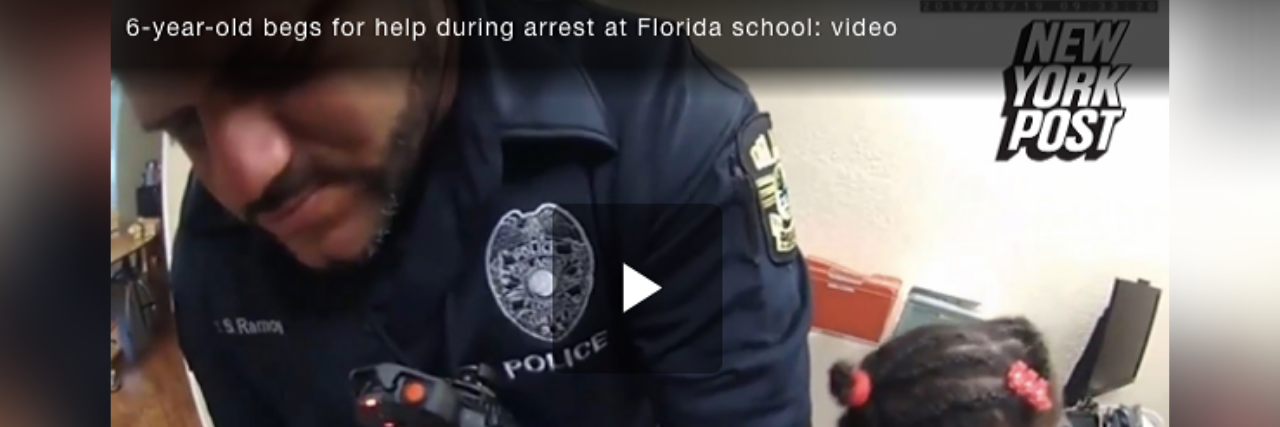Video of Police Arresting 6-Year-Old Shows We’re Failing Kids Who Act Out
“Help me.”
Those words echoed in my mind for quite some time after I heard them. They were the words of 6-year-old Kaia Rolle, who, in September, was restrained with zip ties, escorted to a police car and charged with misdemeanor battery after kicking and punching three employees at the school in Orlando, Florida where she attends.
Police body camera footage released by her family on Monday shows Kaia pleading for help and asking for a second chance as police escort her out of the elementary school.
It’s a haunting scene I couldn’t seem to shake in part because it’s so familiar. Hearing the smallness of her voice and seeing the slight bounce in her walk made me remember just how little 6 years old is. As I watched the video, I wondered how the adults who watched her get arrested didn’t see just how innocent she was. I wondered how they could stand back and let that happen. I wondered why they didn’t see that in this moment, they were failing her.
I was upset by it, but not surprised, because I’ve known parents whose children went through the same thing. I’ve seen these types of situations play out in real time as I’ve advocated for the needs of my son who is on the autism spectrum.
Editor’s note: The following video might be hard to watch for some readers.
In an interview, Kaia’s grandmother said her granddaughter was struggling with the side effects of sleep apnea and was “acting out” as a result. They were working hard to get the issue under control. Yet, it seems none of this context was taken into account by school administrators who chose to treat the first-grader as an aggressor instead of a child in need.
The scene triggered memories of me battling with my son’s IEP team about an abrupt change in behavior he experienced in second grade. He had gone from being happy-go-lucky at school to being frustrated to tears almost daily. The overwhelming emotions he worked so hard to contain all day came bursting out in uncontrollable after-school meltdowns where he threw books and chairs and cried until his body shook and his shirt was soaked with sweat.
When I asked his teacher if there was some change at school that was making him behave this way, I was told everything was fine, but that he didn’t seem very interested in participating in groups. As I pressed for more information, I discovered my son had been hiding under tables and inside classroom cubbies. During a scheduled IEP meeting, the school social worker blurted out that my son seemed to have significant anxiety at school and that someone should look into it. She later denied making the statement.
It was becoming increasingly apparent that my son’s actions were being viewed as something the school could do little to change. His teacher told me flat out that he was “noncompliant” and the IEP goals she and the rest of the IEP team gave reflected their low expectations of him. His past compliance and suddenly increased in-school anxiety seemed not to matter, so I refused to sign the IEP and found a parent advocate.
The advocate told me to request an immediate functional behavioral analysis to force the school to track my son’s daily activities, behavior and triggers. The data revealed that my son was having strong reactions to the behaviors of his peers. Their screams and loud crying and banging were upsetting him. Eventually, my son was given extra accommodations, his IEP was modified and he was given access to a quiet area when his classmates were especially loud.
My advocate explained that black boys often don’t get the attention and services they need. Bias and institutional racism causes them to be labeled “troublemakers,” “noncompliant,” “uninterested” and “unwilling to learn.” She said that was why she gave my son’s case so much attention.
As I watched little Kaia get handcuffed and treated like a dangerous menace to society, I knew I was watching the same institutional bias at work — despite the fact that the school officials and officer in the video were people of color.
Like my son, little Kaia needed support and increased accommodations to help her be her best during the school day. Instead of calling the police, Kaia’s school should have put a plan in place to address any potential issues associated with her sleep apnea. Extra time transitioning between tasks, access to a quiet room and help identifying her emotions may have also helped her keep her emotions in check. Like so many of our kids, all Kaia needed was a little love and support — not police intervention. We need to do better.

